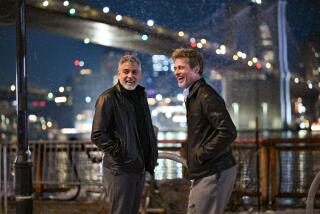‘Inglourious Basterds’
Here are a few of my not-favorite things: scalps graphically removed, throats savagely slashed, heads brutally beaten by baseball bats, necks forcibly strangled, fingers sadistically twisted in open wounds. The ideal person to be reviewing Quentin Tarantino’s violent World War II fantasia, “Inglourious Basterds,” I am not, but as the Basterds knew all too well, sometimes a man has to do what a man has to do.
Not that there aren’t elements to savor in “Basterds” or, for that matter, in Tarantino’s public persona. He has a huge enthusiasm for movies of all kinds -- who else is going to champion the Roy Rogers films of William Witney -- and, judging by his public appearances, access to endless live-wire energy. But at this point in his career, frankly, it feels like his personality is stronger than his films.
For one of the curious things about “Basterds,” the above list of violent acts notwithstanding, is that it is simultaneously bloody and bloodless. Clocking in at 2 hours and 32 minutes, it is unforgivably leisurely, almost glacial, a film that loses its way in the thickets of alternative history and manages to be violent without the start-to-finish energy that violence on screen usually guarantees.
That lack of vigor almost seems to be what the writer-director is after. For one thing, though this film was inspired by a 1978 “Dirty Dozen” knockoff that was more conventional both in the spelling of its title and its story, “Basterds” splits the narrative focus into three.
The plot alternates among a group of bloodthirsty Jewish American GIs under the command of Lt. Aldo “The Apache” Raine (Brad Pitt), a fugitive Jewish woman named Shosanna (Melanie Laurent) who owns a movie theater in Paris and a German SS officer, Col. Hans Landa (Christoph Waltz), who specializes in ferreting out Jews. (The Jewish element may sound strong, but it’s just a plot construct: The characters might as well be renegade Benedictine monks for all the difference it makes).
As if this split weren’t enough, “Basterds” breaks itself up yet again, this time into a series of chapters, more or less self-contained set pieces, that play less like elements of a coherent whole than like a series of linked short films. Some of these set pieces have their virtues, but more than a few of them go on too long and, by emphasizing the film’s episodic nature, hamper its ability to hold together as a feature.
Also getting in the way is Tarantino’s inevitable self-indulgence, his willingess to please himself by choosing movie moments over genuine emotion, making a point of having Frenchwoman Shosanna, for instance, say, “We respect directors in our country.” As it goes on and on, “Inglorious Basterds” feels increasingly like the kind of hollow, fanboyish cinema that is all the rage these days.
To be fair to “Inglourious Basterds,” it starts out more promising than it ends. Opening “Once upon a time . . . in Nazi-occupied France,” it immediately introduces us to its most polished, most successful character, Landa, beautifully played by German-born Waltz, who took the best actor award at Cannes for this performance.
So sophisticated that the plot demands he speak four languages fluently (Tarantino said he almost gave up on the film when he despaired of finding an actor with this linguistic ability), the colonel is a classic movie Nazi, oozing odious evil in German, French, English and Italian, and graphically showing us why he came by his nickname, the Jew Hunter.
Having just as much fun is Pitt, who seems more relaxed and comfortable in these comic character parts than in conventional leading man roles. His Aldo the Apache, a direct descendent of mountain man Jim Bridger, with an accent to match, does not mince words when he gives his squad of eight their behind-the-German-lines marching orders. The Nazis, he says, need to be “dee-stroyed.” And the man himself personally requires 100 Nazi scalps from each of his men.
Not having any fun at all, as might be expected, is on-the-run Shosanna. Yes, her theater in Paris gets to show terrific films like the German mountain epic “The White Hell of Pitz Palu” and French director Henri-Georges Clouzot’s corrosive “Le Corbeau.” But her life is in constant danger, and, to make things worse, Frederick Zoller (“Good Bye Lenin’s” Daniel Bruhl), a cheerfully obnoxious German war hero, won’t stop pestering her.
The chapters of “Inglourious Basterds” at first focus on these plot strands one by one, but by the time they all come together in a finale that rewrites history with a particularly Tarantino flourish, it is hard to care what happens to anyone in them.
Despite nods to notions like Jewish revenge and the power of cinema, the director has paid so much attention to the film’s peripherals he has neglected to provide a center worth embracing. You can raise B pictures to A picture status, as Tarantino has made a career out of doing, but giving them A picture value is not so easily done.
--
--
‘Inglourious Basterds’
MPAA rating: R for strong, graphic violence, language and brief sexuality
Running time: 2 hours, 32 minutes
Playing: In general release
More to Read
Only good movies
Get the Indie Focus newsletter, Mark Olsen's weekly guide to the world of cinema.
You may occasionally receive promotional content from the Los Angeles Times.











